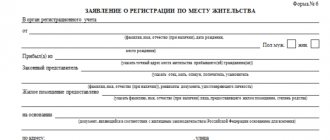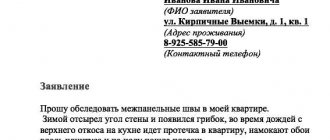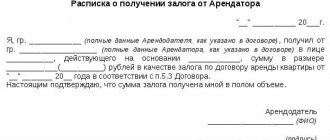RAA Law
If your spouse is hiding from alimony payments or lives in another city and you do not keep in touch with him. It is necessary through the court, then the bailiffs, to formalize a search based on a court decision. The hiding spouse is either found or not. If found, the passport service can also make a request, or he will voluntarily provide Form No. 9. If not, after 6 months you can, on the basis of a search file, declare him missing and then his consent will not be required. But still try contacting the Migration Service Department. As a rule, such issues are resolved more quickly through the Department, since the local, that is, your territorial, FMS will not take on such responsibility, or will take it on the instructions of the Department too. And keep in mind that the child must have an insert about Russian citizenship. If passport services ask for a certificate from the second parent stating that the child is not registered with him . We have a declarative nature of registration. The passport service refers to Art. 65 of the RF IC, that the child’s place of residence is determined by mutual consent of the parents. But this is a relationship between spouses, and not a matter for passport services, which deal with registration and not at all with determining the place of residence.
Sample of filling out the form for registration of citizens of the Russian Federation
- A statement that is written according to the sample.
- A document that confirms the identity of the applicant. This is a passport or birth certificate.
- If a citizen registers in his own apartment, then a certificate of ownership is required; if in someone else’s, then an application from the person who allows registration; if in a municipal apartment, then a social tenancy agreement.
- If registration is issued in someone else’s apartment, then the written consent of all (even temporarily absent) owners is required.
In addition, he must have permanent registration in the place where he lives. This is stated in Federal Law No. 5242-1 “On the right of citizens of the Russian Federation to freedom of movement, choice of place of stay and residence within the Russian Federation”, as well as Government Decree No. 713 “On registration”.
Application for registration: form and writing rules
This form is suitable as an application from an adult owner or tenant. If the owner of the apartment is a minor child, a parent or guardian writes an application for him, indicating the grounds for his right to act on behalf of the child.
- in the address header of the document, the registration authority for which the application is being drawn up is indicated, and information about the person providing housing is written - full name, registration address, date of birth and passport details;
- then the form of the document is indicated - an application;
- below is an informative part containing a request to register a citizen and indicating his full name, date and place of birth, passport details;
- for registration at the place of stay, the deadlines for which the citizen must be registered are immediately indicated;
- in the informative part, the details of the document giving the right to provide housing are written down;
- the informative part ends with a phrase confirming that the citizen lives in the residential premises with the consent of the owner;
- the date and signature are affixed personally by the person drawing up the application in the presence of employees of the registration authority.
- A sample application from the owner for registration at the stand of a certain branch of the Federal Migration Service sometimes contains its own requirements for the execution of the document, which will need to be met.
Please note => How to properly register a plot of land as your property
Features of the procedure
The right of Russian and foreign citizens to free movement within the country is stipulated in Federal Law No. 5242-1 of 1993, however, every citizen is required to notify the Federal Migration Service of their place of residence.
Deregistration in municipal and privatized housing is different. The removal of a citizen from municipal property is regulated by the provisions of the Housing Code of the Russian Federation.
Article 91 establishes the conditions and grounds for the discharge of a citizen:
- the municipality is the owner of the residential premises. He has the right to expel the tenant and members of his family if the premises are used for hidden purposes (not for residence), which leads to deterioration of the condition of the property;
- if a citizen does not pay utility bills for more than 6 months, he can be evicted without consent;
- the municipality has the right to expel a former family member, while he will retain the right to use the property;
- If a citizen does not live in an apartment for a long time without good reason (study, treatment), then he is allowed to be discharged.
Dear readers! The article talks about typical ways to resolve legal issues, but each case is individual. If you want to find out how to solve your particular problem , contact a consultant:
8 (800) 700 95 53
APPLICATIONS AND CALLS ARE ACCEPTED 24/7 and 7 days a week.
It's fast and FREE !
Article 31 of the Housing Code regulates the rules for deregistration from privatized housing. If the property was purchased before marriage, then upon divorce the second citizen will lose all rights to use the apartment. In this case, he is allowed to be discharged without consent.
If the apartment became the property of a citizen as a result of privatization, and if other persons did not participate in the process but were registered, they will retain the rights to use the property.
The law stipulates the conditions under which you need to fill out an application for discharge:
- if a citizen’s living conditions have worsened and he purchased a new apartment;
- if the lease agreement has expired;
- if a transaction of gift, sale or exchange is made;
- if a citizen temporarily or permanently moves to another country;
- if a citizen is called up for military service.
These conditions apply to persons who decide to voluntarily check out of the apartment and register at a new address. There is no need to ask the owner's permission.
When filling out an application for discharge of minors, special rules apply. If the child is under 14 years of age, the guardianship authorities must issue consent for discharge.
If the child's parents are divorced, unmarried, or do not communicate, the process of obtaining the document may take several months:
- If a minor is registered in a municipal apartment or is the owner of part of the property, then any action with the property will require permission from the guardianship and trusteeship authorities. Employees will ensure that the child’s rights are not violated during discharge;
- if the child is not the owner of the apartment, consent is not required. It is enough for both parents to approach the migration service and give their consent.
In cases where an adult citizen cannot act independently, he has the right to issue a power of attorney for an extract. All documents are certified by a notary and sent to an authorized representative to submit an application for deregistration.
If a Russian is discharged with the goal of moving outside of Russia, then in addition to a stamp in his passport, he must receive a statistical departure sheet. This document will be required if the citizen decides to return to his homeland.
What documents are needed for re-registration in one city?
On the territory of the Russian Federation, the main source of migration law is Migration Legislation, represented by a certain set of Federal Laws. The latter, in turn, represent the basic regulators of the migration registration procedure and the general procedure for registering citizens at their place of residence. The current legislation of the Russian Federation obliges all citizens of our country to be on permanent migration registration. This measure was taken by the authorities so that they knew at all times where this or that citizen was, who had a number of obligations to them and, possibly, other persons.
Application for opening a case in court
An application for opening a case in court related to the forced eviction of a person differs from the usual form. First of all, this is due to the fact that the plaintiff applies for the restoration of his rights and at the same time asks to terminate the property claims of a citizen who does not want to voluntarily vacate the living space that does not legally belong to him.
The form with which the requesting party can apply to the court must contain:
- the name of the judicial authority and its territorial affiliation;
- address and passport details of the plaintiff;
- details of the defendant to whom the claims are being made;
- a detailed description of the problem;
- references to current articles of laws, government regulations and the Housing Code of the Russian Federation, which, in the plaintiff’s opinion, were violated by the defendant.
Read also: How to obtain a town planning plan through the MFC
At the end of a written appeal to government agencies, it is imperative to include a list of documents on the basis of which judges will be able to make a legal decision.
A sample statement of claim, where the owner of the residential premises asks to evict and deregister his ex-wife, is presented in the photo. In other situations, the petition can be written by analogy.
Due to the fact that drawing up such a document requires certain knowledge in jurisprudence, most citizens of our country entrust the resolution of issues to specialists in housing law. If a person gives the right to someone else to file a claim instead of himself, then this requires notarization.
It should be noted that in the case when a claim is filed regarding the discharge of a mother with a child, especially a minor, the court makes a decision in favor of the latter. This happens for the reason that children until they reach the age of 18 are guaranteed the right to maintain living space. A court verdict may indicate the plaintiff’s obligations to the young citizen, which most often relate to the payment of compensation for the square meters of area due to him based on shares.
It is important to remember that the procedure for filing a claim involves paying a fee.
Housing Consultant
The application for a personal visit to the migration authority is drawn up according to Form No. 6 . view and download a sample application for permanent registration here: [Application form according to form No. 6]. Preliminary actions and rules for submitting an application form to legalize a change of place of residence can be divided into stages: An application for permanent registration at the place of residence is submitted to the regional department of the FMS (migration service), MFC (multifunctional center) or local government body during a personal visit. Internet users have the opportunity to register by visiting the federal government services portal located at www.gosuslugi.ru.
What is the form of a notarial application for re-registration
General provisions At the moment, the laws of the Russian Federation oblige all citizens of the Russian Federation, as well as persons staying in the country for a long time, to register at their place of residence. This also applies to children under 18 years of age. Moreover, it is the registration of this socially unprotected category that is closely monitored by the guardianship and trusteeship authorities, as well as the prosecutor’s office. The reason for this is the abundance of cases of fraud involving the deregistration of children and the subsequent resale of real estate.
After submitting the documents, they are sent to a special commission, at which the owner of the premises (in our case, the city) makes a decision on the registration of another citizen in the residential premises. 4. What documents are required for registration at a place of temporary stay 1. Passport or other identification document. 2. A document that gives the right to move in. It may be a rental agreement or transfer of housing for temporary use, or a written consent of the owners of the living space. What documents are needed for registration in an apartment (list)? Attention FMS, paperwork Before talking about what documents are needed for registration in an apartment or other residential premises, you need to understand the following points: 1. What types of registration exist? In accordance with the current Rules for registration and deregistration of citizens of the Russian Federation at the place residence and place of residence within the Russian Federation, registration (also known as registration) of citizens is of two types:
The homeowner's application for registration is required
The basis for registration (at the place of residence or place of stay) is the application of the owner. The application is written in any form, where the owner of the property notifies the FMS of his intention to register a citizen of the Russian Federation in his living space. If there is more than one home owner, consent to register all owners is required. Hello Nargiza. I cannot answer your question specifically; you need to clarify this with the person who is asking you for some kind of statement. You also did not indicate what your status is now. Most likely, an application is required from the owner to provide a residential address after receiving a temporary residence permit or residence permit.
Sample power of attorney for re-registration
passports of the owner (owners) and the person applying for temporary registration;
written consent of the owner or all owners; statement from the owner and all registered citizens in the apartment or house at the moment; consent from the housing and communal services department, which confirms the owner’s right to register someone; receipt of payment of state duty; To obtain permanent registration, the same applications and consents are required, but here evidence of ownership of the apartment is also added, that is, it is necessary to submit all certificates of ownership of the apartment or house, as well as make photocopies of them. If the authorized person has a notarized power of attorney. With a notarized application for the owner’s consent for registration. Certificate of civil status of the applicant; Consent to the departure of a minor child outside the Russian Federation; Consent of the spouse to purchase/sell real estate; Application for renunciation of inherited property; Application for acceptance of inherited property; Statement of consent with privatization; Statement of consent with registration at the place of residence; Application for revocation of power of attorney. The cost is: 8 euros - for citizens of the Russian Federation; 23 euros - for foreign citizens.
Application for discharge from an apartment
You can issue an extract from an apartment from your permanent place of residence in accordance with the procedure outlined in the Law. This procedure can be performed either at the old place of residence or at the new one. In the first case, an application for deregistration is written in free form (a sample can be downloaded below), in the second case, an application for registration at the place of residence is submitted in Form 6 with the completion of a tear-off counterfoil, which is the basis for deregistration at the previous address.
- name of the department of the responsible service where the apartment is registered;
- Full name of the applying citizen and his date of birth;
- information from the passport;
- reason for discharge;
- information about the legal representative and new registration;
- address details of previous place of residence;
- signature of the applicant and the day of signing the application.
Please note => Persons belonging to the preferential category of citizens
Agreement on the obligation to leave the apartment
Share on
- How is a notarized obligation to check out of an apartment completed?
- Let's figure out when it is necessary to have an apartment purchase and sale agreement certified by a notary
- Is a notarial obligation required when deregistering a minor?
Obligation for maternity capital They are accompanied by an obligation for maternity capital. You can fill it out yourself or at a notary office.
This is also where reassurance occurs. It is not necessary to contact only a public notary; a “private notary” is also quite suitable.
If a person avoids canceling registration on their own, it is necessary to write an appeal to the court authorities.
PRO new building (Moscow)
The owner of the apartment has the right to register children who have not reached the age of majority. This is confirmed by the Civil Code and Article 20. The owners' consent is not required for this. It is important to discuss this point before any transactions are made.
- Registration authorities not only deal with the registration itself, but also request all the data that they may need.
- It is not necessary to deregister at your old place of residence, nor is it necessary to provide a certificate of deregistration. Representatives of the Federal Migration Service will do this when the certificate is filled out.
- The maximum period for which certificates of registration at a new place and removal from the old one are issued is three days.
Instructions for registering in your new purchased or someone else’s apartment
- For tenants: a warrant or social tenancy agreement, a Russian passport, permission from the municipality (if it registers a non-relative to any of the tenants).
- Those registering must submit: a Russian passport; birth certificate if children under 14 years of age are registered; departure slip if you checked out in advance.
- Those applying for registration are given their passport and informed when it can be picked up with a registration stamp. If those being registered have been discharged in advance, they can be registered on the same day (maximum 7 days). If you have not checked out, registration will usually take 7-30 days.
Persons registered in the apartment have the right to use it in full. But registration does not mean that a person has the right to make any transactions regarding real estate, i.e. transactions of purchase and sale, gift or exchange. Only its owner or owners can dispose of real estate.
Re-registration of a child: basic rule
Registration is an outdated concept that is still widely used in everyday life . According to current laws, it has been replaced by “permanent registration at the place of residence,” which can be the only one for each Russian citizen or foreign citizen permanently residing in the territory of the Russian Federation for a given time period. Divorce is not a reason for denying a child the right to use housing. Usually in this case, minor children remain to live in their mother’s living space. In most controversial cases, the court is guided when making a decision by the actual place of residence of minors:
Regulatory rationale
Accommodation in an apartment or room is provided for various reasons. For example, directly by the owner in relation to his family members, by testamentary refusal, maintenance agreement with dependents, rental and other agreements and acts.
In some cases, the right of use is terminated: the owner changes, the family breaks up. Art. 35 of the Housing Code of the Russian Federation gives the owner of real estate the full right to evict a tenant from the occupied area who has lost the basis for occupying his square meters.
To confirm that he is right, the plaintiff points to the legal norms governing his situation. In this case, these include Art. 31 Housing Code of the Russian Federation.
It is permissible to discharge a person from an apartment according to the following standards:
- for social hiring: art. 83 Housing Code of the Russian Federation;
- For municipal apartments, Art. 71 and 91 Housing Code of the Russian Federation.
We suggest you familiarize yourself with: How to write a letter to the President of Russia{q} Sample letter to V.V. Putin.
You can discharge a person against his wishes both from a municipal and from a privatized apartment.
1. Grounds for deregistration from a municipal apartment:
- failure to pay utility bills for more than 6 months in a row;
- long absence of a person from the address;
- gross disturbance of neighbors (hooliganism, systematic violation of the silence regime, etc.);
- use of the apartment for other purposes (organization of production, warehouse, animal shelter, etc.);
- failure to comply with sanitary and hygienic standards;
- the impossibility of the tenant and the tenant living together (hostile relationships, scandalous and conflict situations, etc.);
- damage to the apartment (destruction of structures, utilities, etc.);
- expiration of the period for providing an apartment for living (the sublease agreement, lease, etc. has been completed);
- preparing a house for demolition as dilapidated or in disrepair;
- illegal registration (concluding a social tenancy agreement in violation of the law, illegal registration, etc.).
The tenant, members of his family and others living in the municipal apartment can be evicted.
2. Grounds for deregistration from a privatized apartment:
- termination of family relations with the owner of the apartment (divorce, lack of common household management and joint responsibility in the housing sector, etc.);
- inappropriate use of the apartment as non-residential;
- violation of sanitary, fire safety and other mandatory requirements;
- antisocial lifestyle;
- expiration of the term of use of the apartment by the tenant (rent, rental, subletting, temporary residence, etc.);
- change of owner of housing (donation, exchange, sale of apartment, etc.);
- the emergency condition of the house and its preparation for demolition;
- illegal registration and residence (fictitious registration, illegal entry into housing, etc.).
Both the owner and his tenants can be evicted from a privatized apartment.
Each option has its own characteristics, but they are all closely related to the right to use housing. In order to remove an unwanted tenant from registration and subsequently evict him, it is necessary to prove in court that the person did not have the right to use or lost it.
Example 1: A person receives an apartment as a gift, but cannot move into it due to the residence of a third party. The new owner must go to court and ask that the violation of property rights be corrected by deregistration and eviction of the stranger.
Example 2: A citizen appealed to the court with a request to evict her sister, who has been considered missing for 5 years. To do this, you first need to obtain a court order stating that your sister is missing. And then a claim is filed for deregistration.
Application for registration at the place of residence
- Name of the territorial structural unit.
- Personal data of the applicant.
- Gender (check the appropriate box).
- Previous address.
- Legal representative (to be filled in if a minor citizen is registered).
- Details of the owner or other owner of the apartment who allows registration in it.
- A document serving as the basis for moving in.
- Address of the property where the citizen is planning to register. The specified information is taken from the owner’s documents.
- Identity document (indicate information about the type of document, its series, date of issue).
- SNILS if available.
- Date the application was filled out.
- Signature of the person who provided the accommodation.
- personal presence of the owner of such premises with further affixing of his signature in the corresponding column of the application in Form 6;
- written consent from all co-owners or adult users of the residential premises (clause 49.4 of the Regulations), certified by a person authorized to accept documents.
24 Dec 2020 marketur 116
Share this post
- Related Posts
- Waiting lists to improve housing conditions in Moscow
- State support for small businesses in Russia 2019
- Sample application for divorce if there are minor children
- Current Laws on Benefits in the Area of Residence with Benefits for Socio-Economic Status
Sample of filling out an application for redevelopment of a residential premises
Next, the competent authority must consider the submitted application for redevelopment and make a decision on whether to approve such changes or to refuse said approval. The period for making the relevant decision is limited by law to forty-five days.
The final stage of a legally carried out redevelopment is the receipt of an act from the commission that accepted the work carried out in the apartment. Based on this acceptance certificate, all necessary changes are made to the technical documentation of the redesigned residential premises.
Extract and registration through State Services
The next section is filled in with personal data (full name, date of birth, gender, e-mail and mobile phone number). The section below provides passport details. Don’t make a mistake with the series and number - registrars check the entered information with the data of the original passport.
The next item requests information about the new residential address - indicate the exact place of residence. Please note whether you have deregistered at your old address. Indicate whether you are the owner of the new home (below there will be a line to enter the type of document: for example, a certificate of ownership). If not, you will need the consent of the residents for your registration + passports of the owners.
What is the form of a notarial application for re-registration
In order for re-registration to another apartment to proceed quickly and legally, it is necessary to study the laws in the field of registration and choose the appropriate method of re-registration, because there are several of them. It is important to know the prescribed offenses and avoid them.
Legal regulation Every citizen has the right to move freely throughout the territory of our country. This right is guaranteed to him by the Constitution of the Russian Federation. In addition, he must have permanent registration in the place where he lives. This is stated in Federal Law No. 5242-1 “On the right of citizens of the Russian Federation to freedom of movement, choice of place of stay and residence within the Russian Federation”, as well as Government Decree No. 713 “On registration”. Liability for the lack of temporary or permanent registration is regulated by Article 19.15 of the Code of Administrative Offenses of the Russian Federation.








